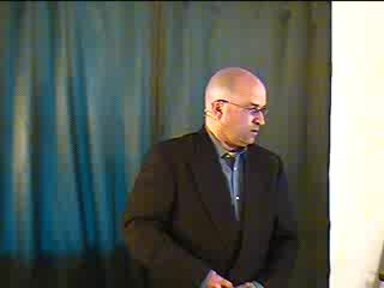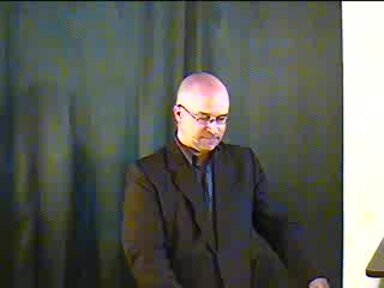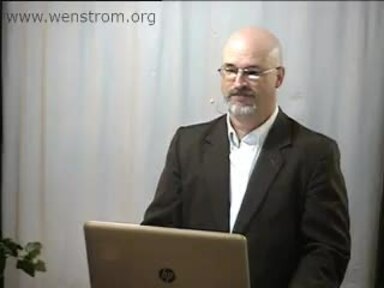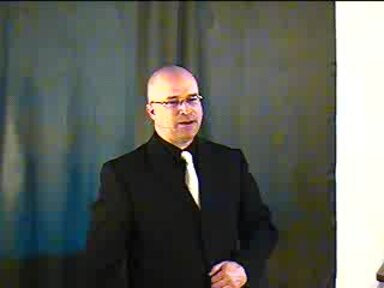Philemon-Philemon 22-25-Final Request, Greetings and Benediction
Wenstrom Bible Ministries
Pastor-Teacher Bill Wenstrom
Sunday May 5, 2013
Philemon: Philemon 22-25-Final Request, Greetings and Benediction
Lesson # 11
Please turn in your Bibles to Philemon 1.
Philemon 1 From Paul, a prisoner owned by Christ, who is Jesus, along with Timothy, our spiritual brother, to Philemon, who is our dear friend and co-worker 2 as well as to Apphia, our spiritual sister and in addition, Archippus, our fellow-soldier, also, the church, which is in your private home. 3 Grace to all of you as well as peace from God our Father as well as the Lord, who is Jesus, who is the Christ. 4 I continue making it a habit of giving thanks to my God always as I myself continue to make it a habit of remembering you during my prayers 5 because I continue to regularly hear about your divine-love as well as your faithfulness, which you continue to regularly demonstrate toward the Lord who is Jesus, which is for the benefit of each and every one of the saints. 6 I make it a habit to pray that the fellowship produced by your faith would cause itself to be manifested as effective because of an experiential knowledge, which produces every type of divine good of intrinsic quality and character, which is in all of us on behalf of Christ. 7 Indeed, I have experienced much joy as well as encouragement because of your divine-love in the sense that the hearts of the saints have been refreshed through you, spiritual brother. 8 Therefore, even though I possess great confidence because of my authority from Christ to command what is appropriate and obligatory for you, 9 I rather appeal to you on the basis of this divine-love, even though I am the one who is identified as Paul, an elder as well as now in fact, a prisoner, owned by the Christ, who is Jesus. 10 I appeal to you on behalf of my spiritual child whom I became the spiritual father of during my imprisonment, Onesimus. 11 The one who was formerly characterized as useless, of no benefit to you but now for your benefit and especially for my benefit, is characterized as useful 12 whom I have sent back to you himself, that is, my very own affections 13 whom I myself in contrast to this desire, could almost wish for my own benefit keep with myself in order that on your behalf, he could render service to me during my imprisonment with reference to the proclamation of the gospel. 14 However, I prefer to do absolutely nothing without your consent in order that your good deed would not be as characterized on the basis of compulsion but rather on the basis self-determination. 15 Indeed, perhaps because of this he was taken away for a brief period of time in order that you would receive him back in person forever. 16 No longer as a slave but rather, more than a slave, namely a divinely loved spiritual brother, especially for my benefit but how much more, for your benefit, both a human relationship and a relationship with the Lord. 17 Therefore, if, and let us assume that it is true for the sake of argument you regard me as a partner and of course you do, then please, you yourself welcome him into the fellowship as you, yourself would certainly welcome me into the fellowship. 18 However, if, and let us assume that it is true for the sake of argument that he has wronged you at all or owes you anything, and we know this is the case, then please, at this time, charge that to my account. 19 I, Paul am writing with my very own hand: I will make restitution in order to avoid mentioning to you that you owe even your very self to me. 20 Yes, spiritual brother, may I benefit from you on the basis of the Lord’s sovereign authority. Please cause my heart to be refreshed on the basis of the Christ’s teaching. 21 Because I was confident of your obedience, I have written to you while being certain that you will do even more than what I request. (My translation)
Philemon 22 At the same time also prepare me a lodging, for I hope that through your prayers I will be given to you. (NASB95)
This sentence is an emphatic addition to the previous request recorded in verses 17-21.
Here in verse 22, Paul wants these two requests simultaneously or at the same and is showing the relationship in time between these two requests in that the purpose of Paul requesting a room to stay in when he visits is for the purpose of checking out the situation for himself with regards to Philemon and Onesimus.
“For I hope that through your prayers I will be given to you” presents Paul’s reason for his previous request that Philemon prepare him a guest room to stay in when he visits in the future.
“I hope” is the verb elpizō (ἐλπίζω), which means “to confidently expect” indicating that Paul “confidently expects” to be given back to Philemon through the prayers of Philemon and the Christians who met in his home to worship the Triune God.
The present tense of the verb is a futuristic present which is used to describe Paul’s certainty that he will soon be given back to Philemon through the intercessory prayers of Philemon and the church which met in his home.
“Through your prayers” expresses the fact that Paul regarded the prayers of Philemon and the Christians who met in his home as the means which caused him to confidently expect to see them all.
“I will be given to you” expresses the apostle’s conviction that he would be graciously given to Philemon through the prayers of Philemon and the Christians who met in his home to worship God.
Philemon 22 Furthermore indeed, simultaneously, please prepare a guest room for me because I am absolutely certain and confidently expect that by means of all your prayers, I will, as a certainty, be graciously given to all of you. (My translation)
This request in verse 22 expresses the depth of the friendship and fellowship there existed between Paul and Philemon.
He did not make this request in order to see if Philemon would fulfill his request to welcome Onesimus into the fellowship of the church which met in his home.
This request in verse 22 would give Philemon and opportunity to demonstrate his great hospitality.
Verse 22 also makes clear that Paul was absolutely certain and confidently expected to be released soon from house arrest in Rome where he was awaiting his appeal before Caesar.
In Philippians 1:25-26, Paul is certain that he will be released from his imprisonment in Rome and in Philippians 2:24, he expresses his confidence that he will be visiting the Philippians shortly, which obviously implies that he was certain that he would be released from his first Roman imprisonment.
Philemon 23 Epaphras, my fellow prisoner in Christ Jesus, greets you, 24 as do Mark, Aristarchus, Demas, Luke, my fellow workers. (NASB95)
Epaphras is the same individual mentioned in Colossians 1:7 and 4:12.
In the former, Paul describes this individual as “beloved fellow bond-servant who is a faithful servant of Christ on our behalf” (1:7).
In the latter, the apostle describes him as one of the Colossians number and a “bondslave of Jesus Christ.”
Also, in this verse Paul says that Epaphras was always laboring earnestly in his prayers for the Colossians.
The fact that he is described as a faithful servant and always praying for the Colossian believers would indicate that he was a pastor-teacher in Colosse who probably taught in one of the homes in that city.
Here in Philemon 23, Paul describes Epaphras as a fellow-prisoner which does not suggest that he was arrested along with Paul and then imprisoned along with him but rather it simply means that Epaphras voluntarily stayed with him in his own rented quarters as he was awaiting his appeal before Caesar.
This is clearly indicated by the book of Acts which records the account of Paul being arrested, unjustly incarcerated, then appealing to Caesar, arriving in Rome and allowed to have his own rented quarters until his case came before Caesar.
This account does not mention any of these individuals as being arrested along with Paul.
Colossians 1:8 reveals that Epaphras informed Paul in Rome of the Colossians’ love through the Spirit which implies that he could travel freely, which would indicate that he voluntarily stayed with Paul in Rome, more than likely to offer encouragement and help him.
“In Christ Jesus” indicates that Epaphras was Paul’s fellow-prisoner in the cause of Christ Jesus and denotes that Epaphras helped Paul propagate the teaching of the gospel while in Rome, which centers upon the person and work of Jesus Christ (cf. Romans 1:3-4).
“Mark” is the author of the Gospel of Mark and the cousin of Barnabas who accompanied Paul and Barnabas during the first missionary journey but deserted them in the middle of it.
It was because of this that Paul and Barnabas parted ways during this missionary journey.
Mark is also called “John-Mark” in Acts 12:22.
The fact that Mark is with Paul in Rome when Paul was writing to Philemon indicates that there was a reconciliation between Paul and Mark and that Paul had forgiven him.
“Aristarchus” was from Macedonia and was a traveling companion on Paul’s missionary journeys (Acts 19:29).
He and Gaius were seized by the Ephesian mob during a riot provoked by the silversmiths of that city.
He was a native of the city of Thessalonica (Acts 20:4; 27:2) and accompanied Paul from Greece (Acts 20:4) and to Rome (Acts 27:2).
Paul calls him a “fellow-prisoner” in Colossians 4:10 and is with Paul in Rome when the apostle pens Philemon.
Church tradition says that he was martyred during the persecution of Nero in the mid to late sixties.
“Demas” is an individual who Paul describes along with Aristarchus, Mark and Luke as his fellow worker.
Unfortunately, Paul says that he deserted him and went to Thessalonica during his second final imprisonment in Rome because he was in love with the cosmic system of Satan (2 Timothy 4:10).
“Luke” was a close personal friend and traveling companion of the apostle Paul and a doctor (Colossians 4:14) who penned the gospel of Luke as well as the book of Acts.
The early church fathers say that he was from Antioch, which is substantiated by several passages in Acts (Acts 11:19–27; 13:1–3; 14:26; 15:22, 35; 18:22).
He is mentioned in the writings of Paul in Colossians 4:14, 2 Timothy 4:11 and here in Philemon 24.
Many scholars believe Luke wrote his Gospel and the book of Acts while in Rome with Paul during the apostle’s first Roman imprisonment.
Apparently Luke remained nearby or with Paul also during the apostle’s second Roman imprisonment since shortly before his martyrdom, Paul wrote that “only Luke is with me” (2 Timothy 4:11).
“My fellow workers” describes Mark, Aristarchus, Demas and Luke with regards to their service in the propagation of the gospel throughout the Roman Empire.
The word describes these four individuals as joint-partners with Paul and Timothy in the advancement of the communication of the Word of God throughout the Roman Empire (cf. Phlp. 1:7).
It denotes that they contributed their time, talent, treasure and truth for the advancement of the communication of the Word of God and for the care of the body of Christ. The word always denotes undefined work in the ministry.
Philemon 23 Epaphras, my fellow-prisoner in the cause of the Christ, who is Jesus, gives his regards to you 24 as well as Mark, Aristarchus, Demas, Luke, my co-workers. (My translation)
All five of these individuals appear in Colossians 4:10, 12 and 14, which suggests strongly that Paul wrote Colossians and Philemon at approximately the same time in Rome.
The apostle’s description that these four were his co-workers also demonstrates his great appreciation for their service in the cause of Christ while in Rome.
Philemon 25 The grace of the Lord Jesus Christ be with your spirit. (NASB95)
“The grace of the Lord Jesus Christ” refers to the means by which grace might be received, namely through the mind and thinking of Christ, the Word of God, which is inspired by the Spirit of God.
It refers to the Lord Jesus Christ speaking to Philemon and the church which met in his home through the Holy Spirit with regards to the Father’s will for their lives.
Philemon 25 May the grace originating from the Lord, namely Jesus, who is the Christ be united with the spirit of each and every one of you. (My translation)
This verse contains Paul’s Spirit inspired desire that the grace of the Lord Jesus Christ, namely His doctrine or Spirit inspired teaching would be united with the human spirit of each and every person who met in the home of Philemon to worship the Lord.
It was a Spirit inspired desire that Philemon welcome Onesimus into the fellowship of the church which met in his home since Paul wrote Philemon 25 like he did all of Philemon under the inspiration of the Spirit and it was a desire that he expressed in prayer to the Father.
“Grace” contains the figure of metonymy meaning the effect is put for the cause or in other words, the thing effected for the instrument which effects it. Here grace is put for the Word of God which effects grace.
This statement in verse 25 is not merely a farewell from Paul but also a Spirit inspired desire that Philemon would respond to the Spirit’s requests in this epistle regarding the will of the Father for him and Onesimus.







